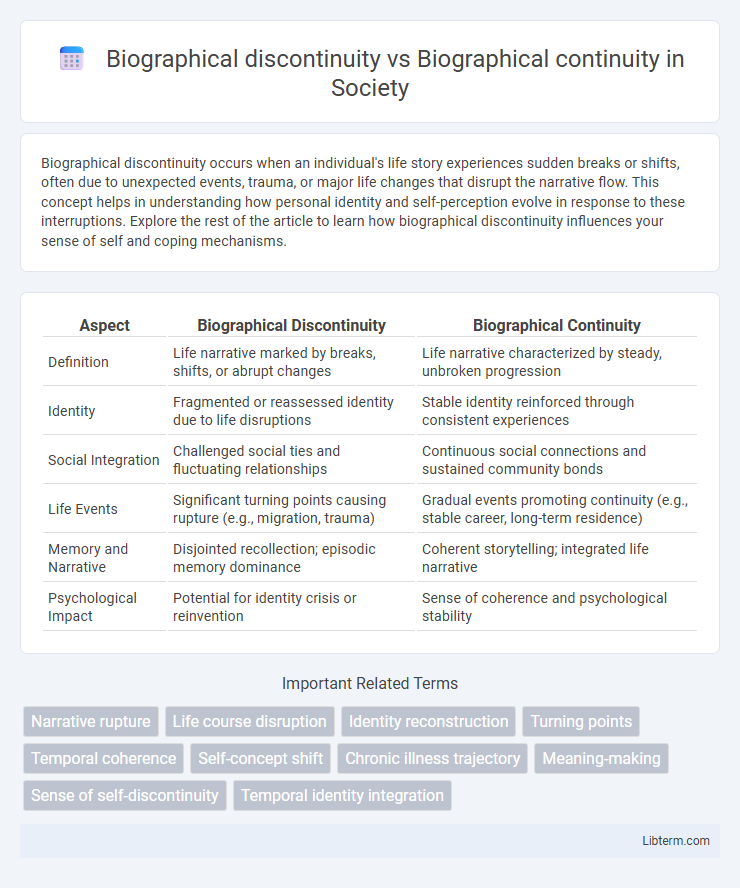Biographical discontinuity occurs when an individual's life story experiences sudden breaks or shifts, often due to unexpected events, trauma, or major life changes that disrupt the narrative flow. This concept helps in understanding how personal identity and self-perception evolve in response to these interruptions. Explore the rest of the article to learn how biographical discontinuity influences your sense of self and coping mechanisms.
Table of Comparison
| Aspect | Biographical Discontinuity | Biographical Continuity |
|---|---|---|
| Definition | Life narrative marked by breaks, shifts, or abrupt changes | Life narrative characterized by steady, unbroken progression |
| Identity | Fragmented or reassessed identity due to life disruptions | Stable identity reinforced through consistent experiences |
| Social Integration | Challenged social ties and fluctuating relationships | Continuous social connections and sustained community bonds |
| Life Events | Significant turning points causing rupture (e.g., migration, trauma) | Gradual events promoting continuity (e.g., stable career, long-term residence) |
| Memory and Narrative | Disjointed recollection; episodic memory dominance | Coherent storytelling; integrated life narrative |
| Psychological Impact | Potential for identity crisis or reinvention | Sense of coherence and psychological stability |
Understanding Biographical Continuity and Discontinuity
Biographical continuity refers to the consistent narrative individuals construct about their lives, maintaining a coherent sense of identity despite changes or challenges. In contrast, biographical discontinuity involves disruptions or breaks in life stories, often resulting from significant trauma, life transitions, or crises that challenge existing self-concepts. Understanding biographical continuity and discontinuity is crucial for psychological resilience, identity reconstruction, and therapeutic interventions aimed at restoring narrative coherence.
Historical Context of Biographical Narratives
Biographical discontinuity highlights ruptures and transformative events that disrupt an individual's life trajectory, often influenced by significant historical upheavals such as wars, revolutions, or social disruptions. In contrast, biographical continuity emphasizes a steady progression shaped by consistent cultural and societal norms within a stable historical context. Historical context shapes biographical narratives by framing personal experiences through collective memory, social structures, and temporal shifts impacting identity construction and life course interpretation.
Theoretical Foundations: Continuity vs Discontinuity
Biographical continuity theory emphasizes the persistence of identity and life patterns despite changes, grounded in the idea that individuals maintain a coherent self-narrative over time. In contrast, biographical discontinuity highlights ruptures and breaks in life stories, suggesting significant transformations or disruptions reshape personal identity. The theoretical foundation contrasts stability as a form of resilience with disruption as a catalyst for new beginnings and redefined self-concepts.
Factors Influencing Biographical Continuity
Factors influencing biographical continuity include personal resilience, social support networks, and the ability to integrate past experiences into current identity. Stability in life circumstances such as employment, relationships, and health promotes a coherent life narrative. Conversely, disruptions like trauma, migration, or major life transitions can challenge continuity, requiring adaptive strategies to maintain a sense of self.
Causes and Manifestations of Biographical Discontinuity
Biographical discontinuity arises from significant life changes such as illness, trauma, or migration, disrupting an individual's self-narrative and identity stability. Manifestations include identity confusion, emotional distress, and difficulty integrating past and present experiences, contrasting with biographical continuity where life events are assimilated smoothly into a coherent personal history. Key causes often involve sudden, uncontrollable events that fracture the expected life trajectory, unlike gradual or anticipated changes seen in biographical continuity.
Psychological Impacts of Life Narrative Disruptions
Biographical discontinuity refers to significant disruptions in an individual's life narrative, often leading to psychological distress such as identity confusion, impaired sense of coherence, and increased vulnerability to depression and anxiety. In contrast, biographical continuity supports a stable self-concept, fostering resilience and psychological well-being by integrating life events into a cohesive story. Understanding the psychological impacts of these narrative disruptions is crucial for therapeutic interventions aimed at restoring narrative coherence and promoting mental health.
Sociocultural Dimensions of Biographical Change
Biographical discontinuity emphasizes sharp breaks in an individual's life narrative, often triggered by sociocultural disruptions such as migration, loss, or social upheaval, which redefine identity and social roles. Biographical continuity highlights the persistence of core values, routines, and social identities despite changes, reflecting cultural resilience and the ongoing negotiation of meaning within a stable sociocultural framework. Understanding these dimensions aids in analyzing how individuals reconstruct their life stories through interaction with shifting societal norms, cultural expectations, and historical contexts.
Case Studies: Continuity and Discontinuity in Biographies
Case studies in biographical research reveal biographical discontinuity as abrupt breaks or shifts in an individual's life narrative, often triggered by trauma, migration, or significant life changes, disrupting previously established identities. In contrast, biographical continuity emphasizes the persistence of core self-concepts and life patterns, despite external changes or challenges, highlighting resilience and adaptation in life stories. Analyzing specific life histories helps scholars understand how people reconstruct their identities either by maintaining continuity or embracing discontinuity to make sense of their experiences.
Strategies for Navigating Biographical Change
Strategies for navigating biographical change emphasize adaptive identity reconstruction and narrative coherence to manage biographical discontinuity, whereas maintaining biographical continuity relies on reinforcing existing self-concepts and life stories through routine and memory integration. In cases of biographical discontinuity, interventions such as cognitive reframing, social support, and meaning-making techniques facilitate adjustment by bridging past and present identities. Individuals experiencing biographical continuity often utilize strategies like consistency maintenance, role stabilization, and environmental control to preserve a coherent life trajectory.
Implications for Research and Personal Development
Biographical discontinuity highlights the transformative impact of critical life events that disrupt an individual's life narrative, challenging researchers to consider nonlinear trajectories in qualitative studies and emphasizing resilience in personal development. Biographical continuity assumes a stable progression of identity and experiences, offering a framework for longitudinal research but potentially overlooking moments of significant change or upheaval. Balancing both concepts enables a comprehensive understanding of human development, informing intervention strategies and enriching narrative-based methodologies.
Biographical discontinuity Infographic

 libterm.com
libterm.com